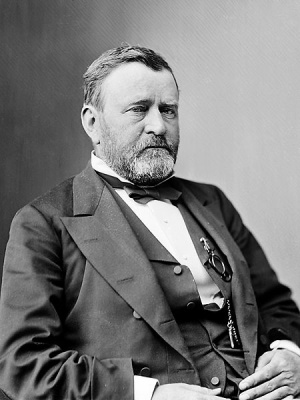Grant, President Ulysses S. (1822-1885) and the Russian Mennonite Immigration

Negotiations of the Russian Mennonites (and Hutterites) with the American government (1873) during President Ulysses S. Grant's second administration centered about two requests in particular: the acquisition of land (interpreted in the U.S. Senate as a million acres in ten or less solid pieces at a moderate cost) and exemption from military duty. The assumption underlying the former request was that the entire group of Russian Mennonites would transplant their several closed colonies to America to perpetuate their own religious life and culture and the use of the German language, but the main cause for the desire to migrate was not economic opportunity but the abrogation of the longstanding exemption privileges in Russia; and it was hoped that they could secure a "written grant" of privileges and immunities signed by the President similar to the one which had been granted "in perpetuity" to their forebears in Prussia by Catherine of Russia. The following steps of negotiation were taken by representatives of the Russian Mennonites:
- A petition for land and exemption was submitted to a U.S. diplomatic officer at St. Petersburg during the middle of 1872. A temporary reply was given to encourage emigration, but later directions from Hamilton Fish, Grant's Secretary of State, were to refrain from making any promises that could not be binding in any event without Senate ratification.
- In August 1873 the Hutterites Paul and Lorenz Tschetter, and the Mennonite Tobias Unruh secured a personal interview with President Grant at the White House. Grant was very much in favor of granting the Mennonites some sort of written assurance concerning military service and asked Secretary of State Fish about the possibility of preparing such a statement; but Fish, a man of caution and integrity, warned Grant in a long letter against signing a promise that might later have to be broken in the event state or national legislatures enacted general military conscription laws.
- Later in the same year Mennonite Cornelius Jansen secured an interview with Grant; and probably because of Jansen's great diplomatic abilities Grant's interest in the Mennonite request was revived. This time Grant contacted his Secretary of Interior, Columbus Delano; and his concern centered not on military exemption for the Mennonites but on securing for them the land that they desired. The Grant-Delano proposal was submitted to Congress in Grant's 1874 "State of the Union" address, and a bill was subsequently introduced into the Senate which was designed to authorize Delano to withdraw from sale or entry such lands as the Mennonites may have desired to occupy upon arrival, up to 500,000 acres. This bill was debated over a period of several months by prominent legislators, but failed ultimately to come to a vote. The main argument in favor of the bill was not the plight of the Mennonite people in Russia but the advantage of obtaining a large group of what were considered to be high-class agriculturalists. Arguments against the bill were: opposition to the closed community and autonomous Mennonite culture; refusal of the Mennonites to help defend the common country; objection to monopolizing the land together with the possibility of fraud on the part of land agents.
- A petition from Mennonite representatives John F. Funk and Amos Herr on behalf of the Russian Mennonites was submitted to the House of Representatives, but was "pigeonholed" for lack of time and support.
Thus the Russian Mennonites received no official encouragement from the United States government to immigrate; and Grant's own personal sympathy with the Mennonite requests must not be interpreted without reference to his general lack of sound judgment on many issues of his administration, which competent historians record had become corrupted with graft and fraud.
Bibliography
Correll, E. H. "President Grant and the Mennonite Immigration from Russia." Mennonite Quarterly Review 9 (1935): 144-152.
Harder, Leland. "The Russian Mennonites and American Democracy Under Grant." In From the Steppes to the Prairies, edited by Cornelius Krahn. Newton, Mennonite Historical Series, 1949.
| Author(s) | Leland D Harder |
|---|---|
| Date Published | 1957 |
Cite This Article
MLA style
Harder, Leland D. "Grant, President Ulysses S. (1822-1885) and the Russian Mennonite Immigration." Global Anabaptist Mennonite Encyclopedia Online. 1957. Web. 16 Apr 2024. https://gameo.org/index.php?title=Grant,_President_Ulysses_S._(1822-1885)_and_the_Russian_Mennonite_Immigration&oldid=64585.
APA style
Harder, Leland D. (1957). Grant, President Ulysses S. (1822-1885) and the Russian Mennonite Immigration. Global Anabaptist Mennonite Encyclopedia Online. Retrieved 16 April 2024, from https://gameo.org/index.php?title=Grant,_President_Ulysses_S._(1822-1885)_and_the_Russian_Mennonite_Immigration&oldid=64585.
Adapted by permission of Herald Press, Harrisonburg, Virginia, from Mennonite Encyclopedia, Vol. 2, p. 564. All rights reserved.
©1996-2024 by the Global Anabaptist Mennonite Encyclopedia Online. All rights reserved.
